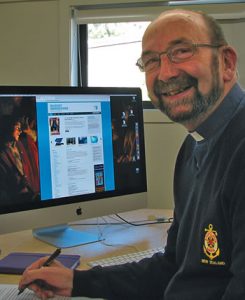“… just after the sun had risen…”

Fr Kevin Head SM
A high school student wrote, “I had just finished my paper route on Easter morning. As I passed the church, the sun was coming up. I didn’t intend to go in for Mass, because I was in the midst of a teenage rejection of the Church. Then it happened! The sun hit the big silver cross in front of the church. I couldn’t take my eyes off it. Its fiery brightness made me realise how the apostles must have felt on the first Easter. An unseen force danced my feet up the church steps. I went in, knelt down, and prayed. For the first time in my life, I began to understand what Easter was all about” (Vision 2000, Mark Link SJ).
“Very early on the Sunday morning, just after the sun had risen, they came to the tomb”. This verse from Mark’s Gospel (16:2) is the Benedictus antiphon for Morning Prayer of the Church on Easter Sunday. The comparison of Christ with the sun is common in ancient Christian writings. The pun in English is neat: the Son, the light of the world, had risen, just as the sun had inevitably risen on Easter Sunday morning! In his resurrection, he defeated sin, death and the devil.
For his closest friends and followers, the event of Our Lord’s rising from the dead was beyond all imagining. To their way of thinking, to anyone’s way of thinking, it was impossible in the extreme. And yet, they had clearly witnessed Jesus risen. Otherwise, how could they have preached the Gospel and spread his teaching, as they did, with such single-minded zeal and conviction? “Indeed, the apostolic preaching with all its boldness and passion would be unthinkable unless the witnesses had experienced a real encounter, coming to them from outside, with something entirely new and unforeseen, namely, the self-revelation and verbal communication of the risen Christ” (Pope Benedict XVI, The Reality of the Resurrection, San Fransisco: Ignatius Press, 2011). If Jesus did not rise from the dead, the story of his life and death would have been relegated to nothing more than an insignificant footnote in history, or even less.
The preaching of the Apostles could not have spread throughout the world without the power of the truth of the resurrection of Jesus working within that preaching. It is through that power that the light of God in Christ’s resurrection shines for the whole world.
In his address on Easter Sunday in 2016, Pope Francis said, “Let us think for a while, each of us, think about the daily problems, the illnesses we have been through or of one that a relative has; let us think about wars, human tragedies and with simplicity, with a humble voice, alone, before God, let us say, ‘I do not know how this is, but I am certain that Christ is Risen and I have put a wager on it’. Brothers and sisters, this is what I wanted to say to you. Go home today, repeating in your hearts: ‘Christ is Risen’.”
The good news of Easter is that Jesus has beaten sin and evil and death, and so shall we if we open our hearts to his Easter power. The good news is that, in our lives, every Good Friday can be transformed into an Easter Sunday. Nothing can defeat us any more – neither pain, nor sorrow, nor even death. Easter invites us out of darkness and sin into the light of Christ risen. We are joyful in the light that darkness can never defeat. We are bathed in the light of Christ, the Son, who is risen from the dead! Alleluia!
 Entries(RSS)
Entries(RSS)